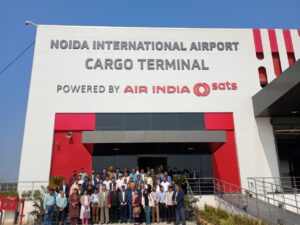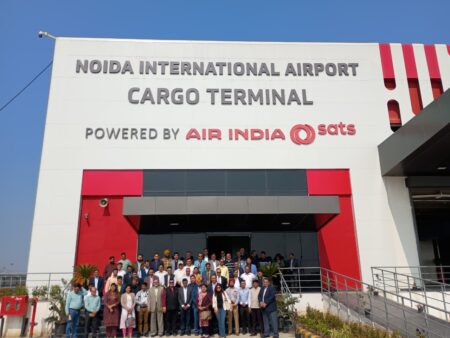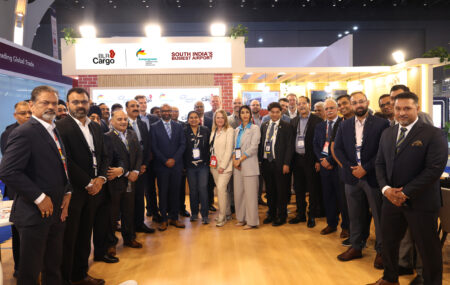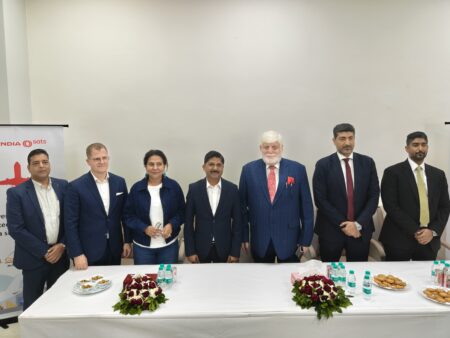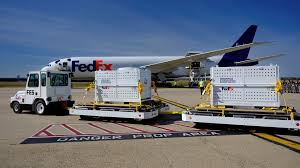Vineet Malhotra, co-founder and Director, Kale Logistics Solutions, details how Kale’s ACS promotes paperless trade, reduces cargo dwell times and truck congestion, and cuts fuel consumption by 80 percent, enhancing sustainability and efficiency in air cargo logistics.

Global bodies, including the United Nations, praise Kale’s paperless trade sustainability initiatives
Kale Logistics Solutions leads globally in cargo community solutions, utilising its Airport Cargo Community System (ACS) to advance sustainability in air cargo. ACS enables paperless trade, benefiting airports handling 1 million tons by saving 1,200–1,500 trees annually. This shift reduces documentation, cuts cargo dwell time, and eases truck congestion, improving resource planning with advance shipment notifications. Studies reveal ACS reduces gate congestion by 80 percent, slashing fuel use by waiting trucks, highlighting its environmental and operational advantages.
Enhancing efficiency and sustainability
Kale Logistics Solutions’ ACS platform goes beyond transactional operations to revolutionise air cargo logistics. A pivotal feature, Truck Slot Management, allows seamless booking of appointments with terminal handlers, optimising truck flow and preventing congestion. This module ensures timely cargo handling and reduces paperwork, enhancing operational efficiency by 75 percent from gate to warehouse. By slashing paper-based processes by 90 percent, ACS supports e-freight initiatives and sustainability goals, significantly cutting CO2 emissions linked to reduced truck wait times. This system empowers cargo handlers with real-time shipment information, fostering optimal resource planning and enabling direct dock access for truckers without gate or counter documentation. Kale’s ACS sets a new standard in eco-friendly logistics, driving industry-wide advancements in efficiency and sustainability.
Sustainability impact
Kale Logistics Solutions’ paperless trade initiatives are lauded by global bodies like the United Nations for advancing logistics sustainability. Their metrics-driven approach sets industry benchmarks, making sustainability measurable. Beyond environmental goals, Kale aims to fulfil broader ESG objectives for air cargo through ACS, ensuring a comprehensive impact on the industry.
Transformative impact
Kale Logistics Solutions showcases impactful sustainability successes across airports worldwide. Mumbai International Airport achieved a 10 percent increase in international cargo volumes, handling approximately 822,963 tonnes in 2024 compared to 770,955 tonnes in FY22. Kempegowda International Airport in Bengaluru saw a record 12 percent rise, handling 439,524 tonnes in FY24, up from 392,668 tonnes in 2021. Both airports implemented Kale’s Cargo Community Systems, significantly enhancing operational efficiency.
At Atlanta Airport, Kale’s digital solutions led to the prevention of nine tonnes of CO2 emissions since early 2021, equivalent to planting over 1,500 trees. The study involved 1,839 shipments, 389 trucks, and 680 tonnes of cargo processed in the first seven months of 2021. Kale’s Slot Management tool saved over 5,650 litres of fuel, USD 69,000 in labour costs, and 1,945 man-hours, streamlining operations and optimising resource utilisation. These case studies underscore Kale’s commitment to sustainability and operational excellence in air cargo logistics.
Kale’s Vision
Kale Logistics Solutions envisions a global shift towards digitisation in air cargo, emphasising industry-wide participation in sustainable practices. Their plans include connecting all ACS airports via digital corridors, fostering transparent and paperless trade links. Future initiatives aim to establish sea-air corridors, promoting multimodal trade with sustainable principles. Kale aims for 100 percent adoption of their solutions, transforming global air cargo logistics into a more efficient and eco-friendly network.



